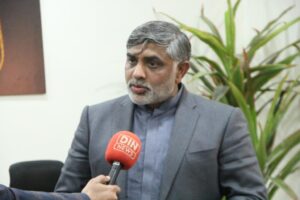
Ghulam Ahmad Pattern in chief APFDA
In Pakistan, agriculture plays a vital role at different times. The use of fertilizers is crucial for increasing
crop yields. Therefore, the transportation and production of fertilizers in Pakistan are of great importance.
Monitoring fertilizer prices is not only a political issue for every government but also plays a significant
role in food security. Every government in Pakistan prioritizes efficient management of fertilizer
transportation, import, and production. This ensures the availability of fertilizers at the lowest possible
prices. The goal is to empower farmers, enabling them to use fertilizers for enhanced crop production.
This not only serves as a political advantage for the government but also plays a crucial role in improving the overall economic conditions by boosting agriculture.
Pakistan extensively uses fertilizers, with significant quantities of urea, DAP (Di-Ammonium Phosphate),
Nitro Phosphate, and calcium ammonium Nitrate being employed. Effective management of fertilizer
production, import, transportation, and timely delivery to farmers is crucial. Unfortunately, challenges
like mismanagement, policy fluctuations, and insufficient sensitivity to market dynamics often lead to
shortages. Sensible policies and adept micro-management are essential to overcome these hurdles and
ensure a steady supply of fertilizers at the grassroots level. This should remain a top priority for every
government in Pakistan.
The management of urea in Pakistan faces challenges due to gas shortages, affecting plants like the Sui
Southern Gas Company (SSGC) and SNGPL, when these gas-dependent plants don’t receive gas, they shut down and the areas across the country suffer from a lack of urea. This imbalance leads to a shortage, prompting the need for imports. Failure to timely import creates panic in the market , impacting Pakistan’s economy. The urea crisis has persisted with intensity over the past three years. Despite continuous alerts from the All Pakistan Fertilizer Dealers Association about the increased use of urea fertilizer , and decrease in DAP, suggesting the need for timely importing urea to balance, no action was taken. When the shortage became apparent nationwide, blame was placed on dealers, hinting at hoarding, later it was revealed as smuggling. Despite efforts like introducing the Portal System by the government and adherence by all dealers, the responsibility for all the flaws was laid on the dealers. Even in 2022 and then in 2023, but the only solution was to run it planned, import it timely so that the All Pakistan Fertilizer Dealer Association always kept saying that its buffer stock should be taken to ten percent levels so that once and for all this issue could be resolved in Pakistan. But unfortunately, this was not done in 2022, and here we are in 2023, and the entire government machinery and all stakeholders connected to this field kept blaming dealers that dealers are behind all this, although we must understand that dealers are neither policy makers nor importers nor producers, but they are just the mediator and facilitator who lifts goods from the company’s point and sell to farmers. This desire is to earn a modest livelihood, but unfortunately, despite being such, the blame for all the flaws is still on the dealers. Apologies for the oversight but let me provide you with the English translation of what I said earlier.
The whole world stabilizes the prices of anything by fulfilling its demand, improving the supply but here,
we don’t seem to understand this concept. For three years, we’ve been trying to control prices without
fulfilling the demand, and we also want to make it formal. In all these actions, when the government
started taking action in 2021, there was only about a hundred to one hundred fifty rupees of over pricing in urea, but with continuous misfortune, for two continuous years, there were interventions, checkposts, and interference from both governmental and non-governmental people difference goes up from 400- 500 between main market and secondary markets. However, the solution was to immediately import it, and give it to farmers. The poor farmer is already giving more money than this entire mess, and if the same product was imported and kept according to the farmer’s needs, he would get it at least a thousand rupees cheaper so he will get subsidy/ extra benefit via surplus supply. Short supply has the problem to reach it’s destination’s so we still request that sensitivity should be understood be estimated according to the increasing demand. The urea demand has increased by more than seven million tons annually, so it should be arranged before time with 10% of buffer stock. The world operates on another principle that when there is a shortage or limited supply of something, the supplier dictates its terms and conditions to the buyers.
Unfortunately, over the past three years in our country, only one stakeholder, a dealer, has been held
responsible for all shortcomings and issues. However, we want to clarify that for the past three years,
dealers has become a rescue boat for all stakeholders. Now, maintaining this scapegoat role for him is
becoming difficult. We should respect the dealer and ensure that those who left the business after the
tumultuous action of the past three years are not only brought back but also provided with a platform for the ease of business for more people. This will create opportunities for Pakistani farmers, contribute to the growing needs and interventions, and play a role in Pakistan’s burgeoning agricultural sector.
Thank you.

